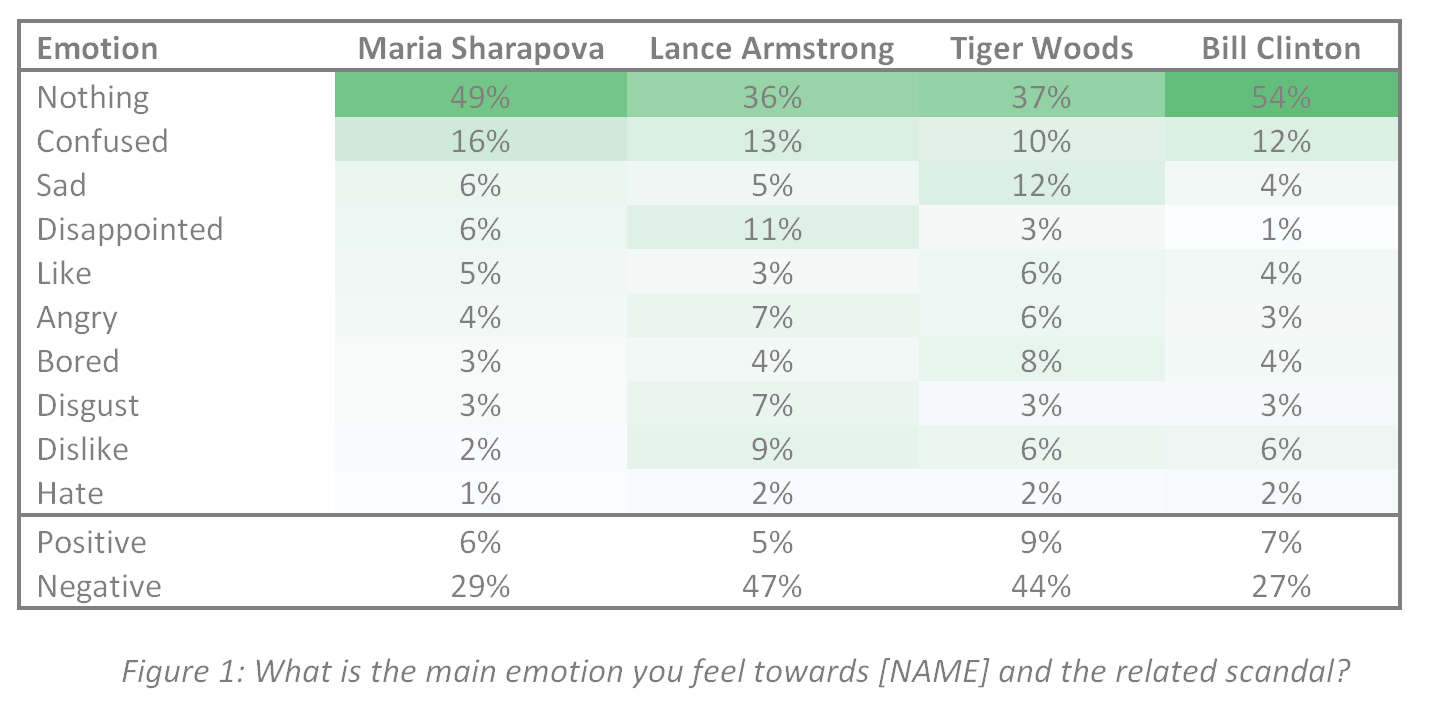Emotalizer: Cheaters
Posted: 10/07/2017

“Once a cheater, always a cheater?”

As British sports fans are dividing their attention between Wimbledon and the Tour de France this week, both sports have battled continuous media attention relating to cheating over the past few years. However, it seems not all sportspeople found to be cheating get the same public reaction, with Maria Sharapova getting a relatively warm reception from the crowd as she re-entered the tennis circuit earlier this year. This led us to consider different forms of cheating, and how the public perceives each offender. We asked the British public the main emotion they feel about four famous individuals who have been caught cheating in two different forms – doping in sports versus marital infidelity.
On the matter of cheating in sports, we can compare the main emotions evoked by Lance Armstrong and Maria Sharapova. Sharapova evokes 29% negative emotions, while emotions evoked by Armstrong are 47% negative. Higher levels of Disappointment, Disgust and Dislike are shown in relation to Armstrong, whereas just under half of the respondents feel no strong emotion towards Sharapova.
This significantly more negative reaction to Armstrong is present despite the lack of current public attention on him and the recency of Sharapova’s ban. Central drivers of the different emotional reactions may be different amounts of blame placed on the individual and the length of time over which the cheating happened. The general perception was that Armstrong spearheaded the cheating effort of an entire team over a long period of time, while Sharapova claimed ignorance and little personal responsibility. Finally the public personas of the athletes are at play, with Armstrong depicted as a calculating bully while Sharapova’s character was left relatively intact.
Cheating on a spouse also leads to differing levels of negative sentiment depending on the individual. Tiger Woods evokes a high proportion of negative emotions (44%) but also higher levels of Sadness than the other ‘cheaters’. He also shows the highest proportion of positive emotions at 9%. Although it was one of the biggest scandals in political history, Bill Clinton now evokes a largely neutral response from the British public.
The high level of Sadness felt towards Woods implies a level of sympathy, likely due to his troubled personal life and fall from grace. The dichotomy of highly negative emotions and but also a relatively high proportion positive emotions may be due to his strong talent the fact that his ‘crimes’ in his personal life harmed rather than helped his career. Although Armstrong doesn’t seem to have benefitted much from the passing of time, Clinton’s reputation appears to no longer be defined by an act that occurred a relatively long time ago and it no longer stirs public emotion to the same extent.
There are various factors at play as members of the public form their opinions about famous individuals’ wrongdoings, including the time period over which it occurred, the degree of blame given to the individual themselves, and importantly the public persona of the famous individual. The media also have a lot of power in forming public perceptions, and can intensify the public’s reaction by the amount of coverage and content they choose to publish. It is possible for a cheating celebrity to survive the public’s wrath, but their PR team has their work cut out for them.